 Petzlover
Petzlover Goldador is originated from United States but Lhasa Apso is originated from China. Goldador may grow 33 cm / 13 inches higher than Lhasa Apso. Goldador may weigh 28 kg / 62 pounds more than Lhasa Apso. Both Goldador and Lhasa Apso has almost same life span. Goldador may have more litter size than Lhasa Apso. Goldador requires Low Maintenance. But Lhasa Apso requires Moderate Maintenance
Goldador is originated from United States but Lhasa Apso is originated from China. Goldador may grow 33 cm / 13 inches higher than Lhasa Apso. Goldador may weigh 28 kg / 62 pounds more than Lhasa Apso. Both Goldador and Lhasa Apso has almost same life span. Goldador may have more litter size than Lhasa Apso. Goldador requires Low Maintenance. But Lhasa Apso requires Moderate Maintenance
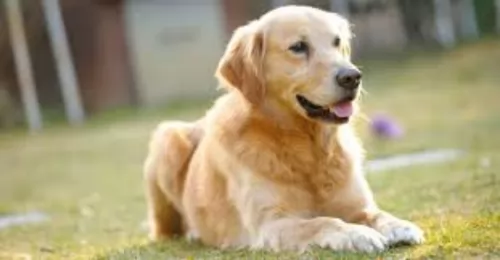 Introduced as a designer dog, the Goldador is beautiful – a mix between Golden Retrievers and Labrador Retrievers, two of the most popular dog breeds in the world.
Introduced as a designer dog, the Goldador is beautiful – a mix between Golden Retrievers and Labrador Retrievers, two of the most popular dog breeds in the world.
The dog was specifically bred to be an excellent working dog, and in fact today he makes the most wonderful guide-, rescue- and therapy dog.
Known also as Golden Labradors, the Goldador is a dog that has many capabilities, one of which is to make a wonderful family pet. As a designer breed, the dog isn’t recognized as a standardized breed by any of the major kennel clubs.
 The Lhasa Apso is a non-sporting dog hailing from Tibet. He was a useful dog to the monks who would use him in the palaces as well as the monasteries to ward off intruders.
The Lhasa Apso is a non-sporting dog hailing from Tibet. He was a useful dog to the monks who would use him in the palaces as well as the monasteries to ward off intruders.
He actually takes his name from the holy city of Lhasa, with the history of the breed going back to 600BC.
Today he is a true companion dog, a family dog, known as as the Tibetan Apso, the Bearded Lion Dog, the Apso and Lhasa.
The dog has been recognized by the American Kennel Club in 1935, in the Non-Sporting Group category.
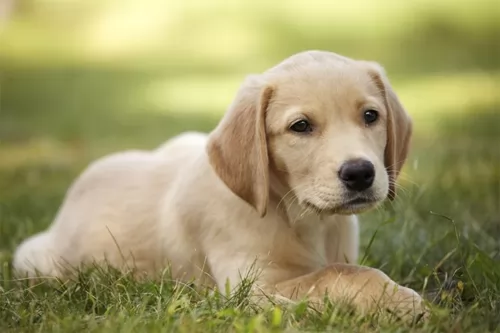 The Goldador is a large muscular dog standing at between 56 – 61cm in height at the withers and weighing between 27 – 36kg in weight.
The Goldador is a large muscular dog standing at between 56 – 61cm in height at the withers and weighing between 27 – 36kg in weight.
His double coat is short and smooth but in can also be longer. It comes in shades of gold or yellow with hints of red, but it can be liver or black too. Goldadors are well-balanced dogs, and just the look in their kind brown eyes makes you realize that this beautiful dog can make a wonderful pet.
He has a well proportioned head with medium length floppy ears, a black nose and a long tail.
Loving, intelligent, loyal and playful, the Goldador is the kind of dog that gets on well with everyone. It’s why he isn’t a particularly good watchdog as he is just too friendly with strangers. You have to be careful though – his rambunctious nature, his energy and playfulness can see him being a bit rough around small children or the elderly. It is why socialization and training are so important for him as then he becomes obedient and more relaxed around everyone.
He loves his human family and never wants to be left on his own for too long. Intelligent and alert, he is an easy dog to train as he makes it easier by being a dog that wants to please.
 Lhasa Apsos are small dogs which stand at between 25 to 28cm in height and weigh in the region of 6 to 8kg.
Lhasa Apsos are small dogs which stand at between 25 to 28cm in height and weigh in the region of 6 to 8kg.
The body length of the dog is longer than the height of the dog. He has brown eyes, a black nose and medium length, floppy ears. The long tail is carried over the dog's back.
Many people get used to seeing a sheared or clipped Lhaso, so when they see a dog where the coat has been left uncut they can’t believe the long, straight, dense coat.
Because the dog hails from Tibet where the weather can be extremely cold, he has a double coat – an under- and outer coat. While the coat looks fairly silky, it isn’t really and is in fact quite course to the touch.
Colors of the coat can be gold, tan, cream, white, black and white. Regular brushing will be needed for the coat because this is a dog with continual shedding. These dogs are regarded as being hypoallergenic as they hardly shed.
Looks can be quite deceiving when it comes to the Lhasa Apso as he is a dog who looks as though butter wouldn’t melt in his mouth and that he is essentially just a cuddly lapdog.
This small little dog is tough, robust, strong-willed and in his heart he believes he is a huge Tiger.
He’ll make his human family a loyal and loving pet but he is wary with strangers, distrusting anyone he meets for the first time. He is a dog that will need to be trained and socialized as he may take over your home in his ‘Tiger’ role.
Smart and dominant, this training will turn him into an obedient dog to have around which is important as he can become bossy if left to go his own way.
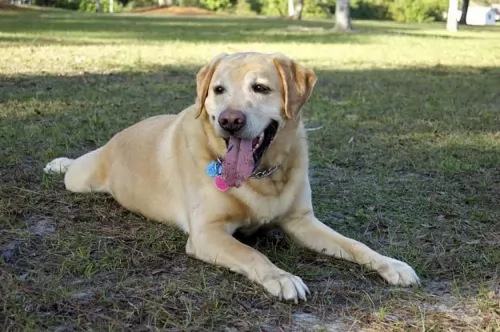 Goldadors are intelligent dogs and they’ve been used extensively for guide- and therapy dogs, loving to be useful and busy. Its the kind of dog that thrives in a loving, active family – one that counts him in as a family member.
Goldadors are intelligent dogs and they’ve been used extensively for guide- and therapy dogs, loving to be useful and busy. Its the kind of dog that thrives in a loving, active family – one that counts him in as a family member.
He makes an exceptional family pet and companion and you can rely on him to be a loyal, loving pet.It’s why the Goldador is becoming such a sought after pet – he simply ticks all the right boxes.
 The Lhasa Apso is a small dog full of surprises. That's because he can be manipulative, naughty and feisty one minute, and sweet and gentle the next. He happens to be a good watch dog too, and will alert you well in advance to intruders.
The Lhasa Apso is a small dog full of surprises. That's because he can be manipulative, naughty and feisty one minute, and sweet and gentle the next. He happens to be a good watch dog too, and will alert you well in advance to intruders.
Because he is small and not a particularly energetic dog, he can slot into life in the city or the countryside with ease. However, exercise is good and necessary for every dog so be sure he joins you on your daily walks or you give him some games indoors.
The Lhasa can be a wonderful family companion and you’ll find that he can get on well with children who have been taught to treat animals with kindness and respect. He isn’t the kind of dog that you keep outdoors but is essentially an indoor dog, relishing the time he spends with his beloved human family and making a wonderful companion.
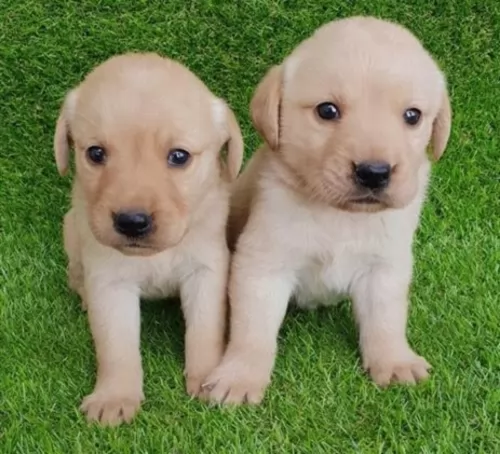 Goldadors luckily don’t have many health issues, and as a hybrid, he has fewer health issues than pure breds.
Goldadors luckily don’t have many health issues, and as a hybrid, he has fewer health issues than pure breds.
You can say with confidence that a nutritious diet, regular exercise, good grooming, lots of love and attention and visits to the vet if your pet is ill are key aspects for maintaining good health.
There are always going to be some common health problems that your Goldie could get -
You’ll need to be checking your Labrador Retriever's floppy ears. They don’t get as much air in them as a dog with erect ears. A dog like the Goldador with floppy ears will need to have his ears cleaned for bacteria. Be very careful how you clean your pet’s ears as you can damage them if you probe too deeply.
Did you know that by spaying or neutering your Goldador can save them from getting some serious illnesses later on? Speak to your vet about it when your pet reaches 9 months to a year of age.
Goldadors can easily put on weight if they aren’t given enough daily exercise to burn off the calories. Some put on weight after being spayed or neutered and it's important to watch their weight after these procedures. Being overweight puts a lot of extra strain on a dog’s internal organs.
 Every dog can develop genetic health problems, but it is highly unlikely that with good care, your Lhasa Apso is going to get sick.
Every dog can develop genetic health problems, but it is highly unlikely that with good care, your Lhasa Apso is going to get sick.
He’s a healthy dog breed that can get to 14 years of age and even older. With Lhasas, health problems can include things like hip dysplasia, eye problems and intervertebral disc disease.
If you are buying a puppy, be careful from where you buy him from. You want careful breeders who screen their parent dogs for genetic diseases. Keeping your dog at the right weight and preventing obesity will also help to ensure he remains healthy.
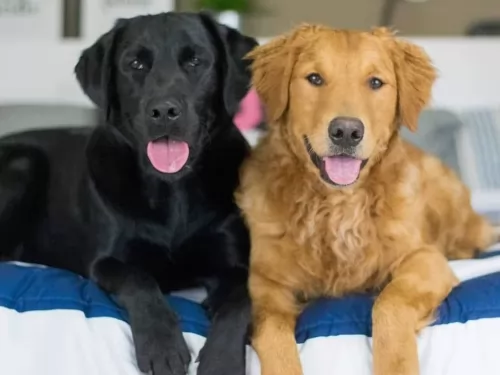 Goom your Goldador regularly. He can either have short- or long hair, but he is a fairly low maintenance dog so a good brush twice a week to remove loose hairs will be good for him.
Goom your Goldador regularly. He can either have short- or long hair, but he is a fairly low maintenance dog so a good brush twice a week to remove loose hairs will be good for him.
Diet is everything, and by giving your Goldador nutritional food, you can actually lengthen his life. If you’re going to be giving him commercially manufactured food, follow the feeding guidelines on the packaging. Remember there are foods that cater specifically for a dogs age and his energy levels.
Try and give him some home-made food from time to time such as cooked rice, vegetables and chicken as well as some raw meat occasionally as this can ensure his skin and coat remain healthy.
Always provide plenty of cool, fresh water, especially seeing that he will be thirsty after a long walk or other exercise. Dehydration in a dog can be fatal.
Provide your Goldador with a warm, dry place to sleep. Make sure that it offers shelter from the sun and rain and also provides shade.
 The Lhasa Apso is going to require regular brushing of his coat as it can get long and then it will matt and tangle easily.
The Lhasa Apso is going to require regular brushing of his coat as it can get long and then it will matt and tangle easily.
There are owners of this dog breed who prefer to send their dog to their grooming parlor where the coat is trimmed short the way they prefer, minimizing the time spent grooming the dog. At the grooming parlour they also check the ears, the teeth of the dog and the nails, particularly if they don’t wear down naturally.
The Lhasa was bred to be a watchdog, so even though he is a small dog, he does his best to guard and protect you. He is no pushover, and training him and socializing him makes him even more adorable to be around.
As man’s best friend, he needs a high-quality, nutritious diet because this helps to protect him from disease. You can feed him the best commercially manufactured foods, but study the packaging details on what the ingredients are. You want to be avoiding corn and wheat, colorants and preservatives.
Your Lhasa has 4 – 6 puppies and as these get older and are weaned they will require 4 meals a day. Once your dog reaches one year of age, he can have 2 meals a day instead of one larger meal.
Every dog loves a little bit of home-made food as a treat, and your Lhasa will wag his tail when you add in some cooked chicken, brown rice and some raw or cooked vegetables into his kibble. Include some raw meat in the diet occasionally as well as this helps to avoid dog skin problems.
Folliculitis is a skin disease starting in the hair follicles of the dog and often occurs in conjunction with other skin disorders like mange. It is found mostly on the dog's abdomen, his armpits and groin and you’ll notice scaly rings with pus and scabs.
To avoid nasty skin diseases which can be very distressing for your pet, remember that your dog's dietary intake plays a huge role in the maintenance of a healthy skin and some raw meat is key to his wellbeing.